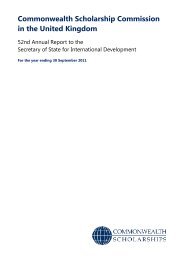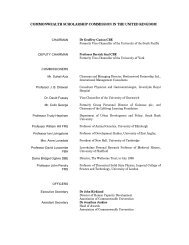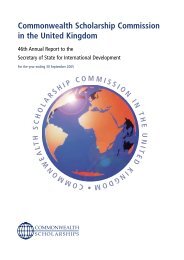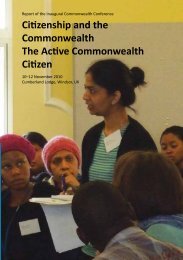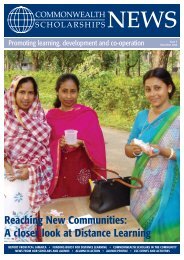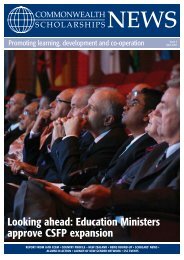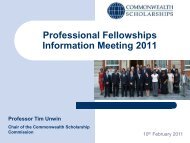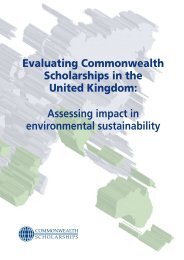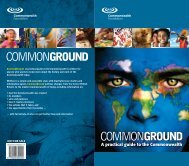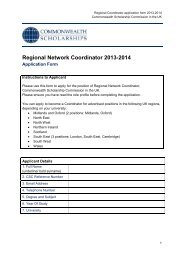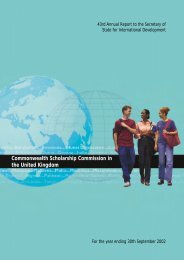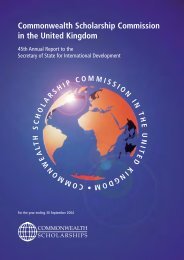Directory of Commonwealth Scholars and Fellows 1960 – 2002
Directory of Commonwealth Scholars and Fellows 1960 – 2002
Directory of Commonwealth Scholars and Fellows 1960 – 2002
You also want an ePaper? Increase the reach of your titles
YUMPU automatically turns print PDFs into web optimized ePapers that Google loves.
Governments <strong>of</strong>fer scholarships for a variety <strong>of</strong> reasons. Typically, however, they represent a balance between<br />
enlightened self-interest <strong>and</strong> a genuine desire to help others. One motive might be to ‘win friends’ in other parts<br />
<strong>of</strong> the world, who, if favourably impressed, will in turn influence policy or public opinion towards their former<br />
hosts in later life. Another might be to provide key skills to the next generation <strong>of</strong> leaders <strong>and</strong> practitioners,<br />
particularly in developing countries, as part <strong>of</strong> strategies to improve living st<strong>and</strong>ards there. In the case <strong>of</strong> the<br />
CSFP there is the additional hope that, by undertaking these activities in the name <strong>of</strong> the <strong>Commonwealth</strong>, we will<br />
strengthen support for that institution.<br />
Sometimes, these aims are thought to conflict. In general, there is more overlap between them than is commonly<br />
recognised. Whether the aim is to influence others or to help them, scholarships need to attract individuals who<br />
will rise to the highest levels <strong>of</strong> their pr<strong>of</strong>essions <strong>–</strong> where they can influence both policy <strong>and</strong> have a catalytic<br />
effect on others. This embraces senior figures in health, education <strong>and</strong> other key services, as much as it does for<br />
central government <strong>and</strong> the private sector.<br />
One area where the interests <strong>of</strong> development policy <strong>and</strong> self-interest overlap is the general desire to ensure that<br />
award holders return to make an impact on their home country. This is not to say that scholarship holders who<br />
remain with their hosts represent a wasted investment for that country. Far from it <strong>–</strong> in an economic sense, they<br />
typically repay the investment <strong>of</strong> their award several times over during their careers, <strong>of</strong>ten in key shortage areas.<br />
In reality, however, that is not the main purpose <strong>of</strong> <strong>Commonwealth</strong> <strong>Scholars</strong>hips, <strong>and</strong> the terms <strong>of</strong> award issued<br />
by individual countries reflect this. Typically, award holders are required to return to their home countries as a<br />
condition <strong>of</strong> their scholarship or fellowship. Many home countries reinforce this with a ‘bond’ system, through<br />
which award holders are required to return for a specific period.<br />
The effects <strong>of</strong> this are clear from the following pr<strong>of</strong>iles, which show that the vast majority <strong>of</strong> award holders do<br />
return to their home countries. In the United Kingdom, an interim survey published at the time <strong>of</strong> the last<br />
Education Ministers conference produced a figure <strong>of</strong> over 90%, whilst suggesting that this might have been<br />
slightly exaggerated by the method <strong>of</strong> tracing respondents. A subsequent survey <strong>of</strong> home country nominating<br />
agencies put the figure at 85-90%. The Canadian figure is lower <strong>–</strong> perhaps due to the proximity <strong>of</strong> the United<br />
States <strong>–</strong> but still comfortably over two-thirds.<br />
Moreover, these figures relate to numbers <strong>of</strong> individuals currently working in their home country. Often the real<br />
situation is much more complex. Our pr<strong>of</strong>iles reveal several examples <strong>of</strong> alumni who have worked abroad for some<br />
years before returning to their country <strong>of</strong> origin, <strong>and</strong> others who have only moved from their country <strong>of</strong> origin<br />
several years after their CSFP award. Many <strong>of</strong> those working overseas are clearly undertaking work <strong>of</strong> relevance to<br />
their home country <strong>–</strong> for example in international organisations, NGOs or embassies. Of those pursuing academic<br />
careers abroad, several have relevant research or teaching interests, <strong>and</strong> maintain collaborations with universities in<br />
their homel<strong>and</strong>. All <strong>of</strong> these would claim that their current location does not imply a lack <strong>of</strong> concern for, or<br />
willingness to contribute to, the country from which they were nominated.<br />
It is also interesting to note that the highest prevalence <strong>of</strong> award holders not returning home comes not from<br />
developing country students, but those from developed <strong>Commonwealth</strong> countries, who study in other developed<br />
countries. In some ways, this is not surprising. Such students tend to be slightly younger, on average, than those<br />
from developing countries, <strong>and</strong> less likely to have employment or family obligations. Some may consciously plan<br />
to work overseas during the early part <strong>of</strong> their career, others are likely to form personal attachments <strong>–</strong> a feature <strong>of</strong><br />
awards over which the Plan administrators have little control! Movement does, however, appear to be two-way,<br />
with for example Canadians remaining in the United Kingdom <strong>and</strong> vice-versa, so can probably be attributed more<br />
to the aspirations <strong>of</strong> individuals than the relative attractions <strong>of</strong> the countries concerned generally.<br />
In analysing the occupations <strong>of</strong> alumni, it is interesting to note the high proportion working in the public sector<br />
<strong>and</strong>, in particular, academic life. Again, this is not surprising. Some <strong>of</strong> the nominating agencies that propose<br />
c<strong>and</strong>idates for the scheme actively seek those likely to contribute to the public service on their return. In the<br />
United Kingdom, significant numbers <strong>of</strong> awards are reserved for staff who are already employed in higher<br />
education. Historically, a high proportion <strong>of</strong> awards has been at doctoral level; for their recipients academic life is<br />
an obvious career path. In these circumstances, the results suggest that the Plan has met its aims.<br />
ix



